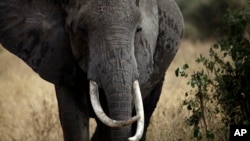Elephants and other wildlife are better protected thanks to new training for Tanzanian game scouts provided by the United States. The training was conducted by U.S. military experts from U.S. Army Africa Combined Joint Task Force - Horn of Africa and the North Carolina National Guard Special Forces, and funded by the U.S. government.
During two three-week training sessions between July 25 and September 9, 50 Tanzanian game scouts were trained in surveillance and patrol techniques, arrest and detention procedures, search and seizure, crime scene investigation, first aid, human rights and rules of engagement.
This training program was initiated after Ambassador Mark Childress visited Rungwa Park in 2015. Seeing the need for capacity building and improved infrastructure to stop the alarming rates of poaching in the Game Reserve, the Ambassador pledged to take quick action and, within a year, marshalled support from a variety of partners to assist the game scouts.
This program is one part of a major effort by the U.S. Government and other partners to protect the elephant and wildlife corridor between Rungwa and Katavi, thus conserving a critical link between the Ruaha-Rungwa and Katavi ecosystems.
The U.S. Agency for International Development, or USAID, in partnership with the Wildlife Conservation Society, is supporting the $8.5-million, five-year Southern Highlands and Ruaha-Katavi Protection Program, or SHARP. SHARPP is focused on four key areas: wildlife management areas; livelihoods; habitat management; and elephant monitoring and protection.
Commenting on the current training efforts, Ambassador Childress noted that an infusion of support from The Wyss Foundation provided equipment and light gear to game scouts at a post that had been taken over by poachers, enabling the game scouts to patrol this post during the rainy season for the first time in more than a decade.
At a training demonstration at Rungwa game reserve, August 25th, the Ambassador remarked, “This program highlights the strong collaboration that the United States has with Tanzania and is a model of what can be achieved when we all work together: government, security forces, the international community, NGOs, the private sector, and Tanzanian citizens across the country.”




